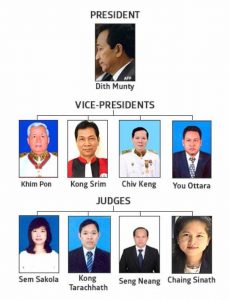Op-Ed: Kyodo News
Cambodia’s Supreme Court orders dissolution of major opposition party
PHNOM PENH, Nov. 16 Kyodo – Cambodia’s Supreme Court on Thursday ordered the dissolution of the country’s main opposition party, in a ruling made ahead of next year’s general election in which the party had been expected to do well.
The ruling, which was handed down by presiding judge Dith Munty after a day-long hearing, also banned 118 Cambodia National Rescue Party members, including party president Kem Sokha, from politics for five years.
The top court heard the case based on a complaint filed by the Interior Ministry, which alleges that Kem Sokha conspired with foreigners in trying to topple the government.
Kem Sokha was arrested in September in a case widely considered to be politically motivated and is expected to be tried later this month, while around half of the party’s lawmakers have fled the country, fearing arrest.
Soon after the ruling, Cambodian Prime Minister Hun Sen hailed the decision, saying it will secure the stability, peace and sustainable development of Cambodia.
Hun Sen, the prime minister since 1985, making him the world’s longest-serving head of government, said all CNRP’s members and their supporters — excluding the party leaders banned from politics — could join his ruling Cambodian People’s Party or other political parties. He said a few dozen other political parties remained that can compete in the next election scheduled for July 29, 2018.
Hun Sen also said that in less than two weeks, the seats won by the CNRP in the last national general and local elections will be redistributed.
During the last general election in 2013, the opposition party won 55 seats in the 123-seat National Assembly, against 68 seats captured by Prime Minister Hun Sen’s ruling CPP, meaning all seats were won by those two parties.
The court hearing was held amid tight security to prevent CNRP supporters from protesting around the courthouse.
Following the decision, the CNRP issued a statement condemning the ruling, saying it ignored the will of more than three million Cambodians who voted for the CNRP.
The CNRP also said it will never recognize the ruling, and the CNRP remains legal as its members of the national parliament and those holding positions in local authorities were elected by the people.
Furthermore, the statement appealed to the international community to take action to rescue the opposition party so it can take part in a free and fair election next year, and to press for the immediate release of party leader Kem Sokha.
The ASEAN Parliamentarians for Human Rights issued a statement saying the move demolished the final pillar of Cambodian democracy and ushered in an era of de facto one-party rule.
“ASEAN Parliamentarians for Human Rights (APHR) called on international partners to cancel their engagement in next year’s national elections, arguing that the CNRP’s dissolution effectively robbed the vote of any legitimacy,” it said.
“The Supreme Court has hammered the final nail in the coffin for Cambodian democracy. Its decision not only leaves the country without its only viable opposition party less than a year before scheduled elections, but also completely undermines Cambodia’s institutional framework and the rule of law,” said APHR Chairperson Charles Santiago, a member of the Malaysian parliament.
“One thing remains crystal clear: the CNRP was dissolved not for breaking any laws, but simply for being too popular and a threat to the ruling party’s dominance. Cambodia’s judiciary has once again proved that its main objective is not justice, but the furtherance of the Prime Minister’s personal prerogatives,” he added.
==Kyodo

